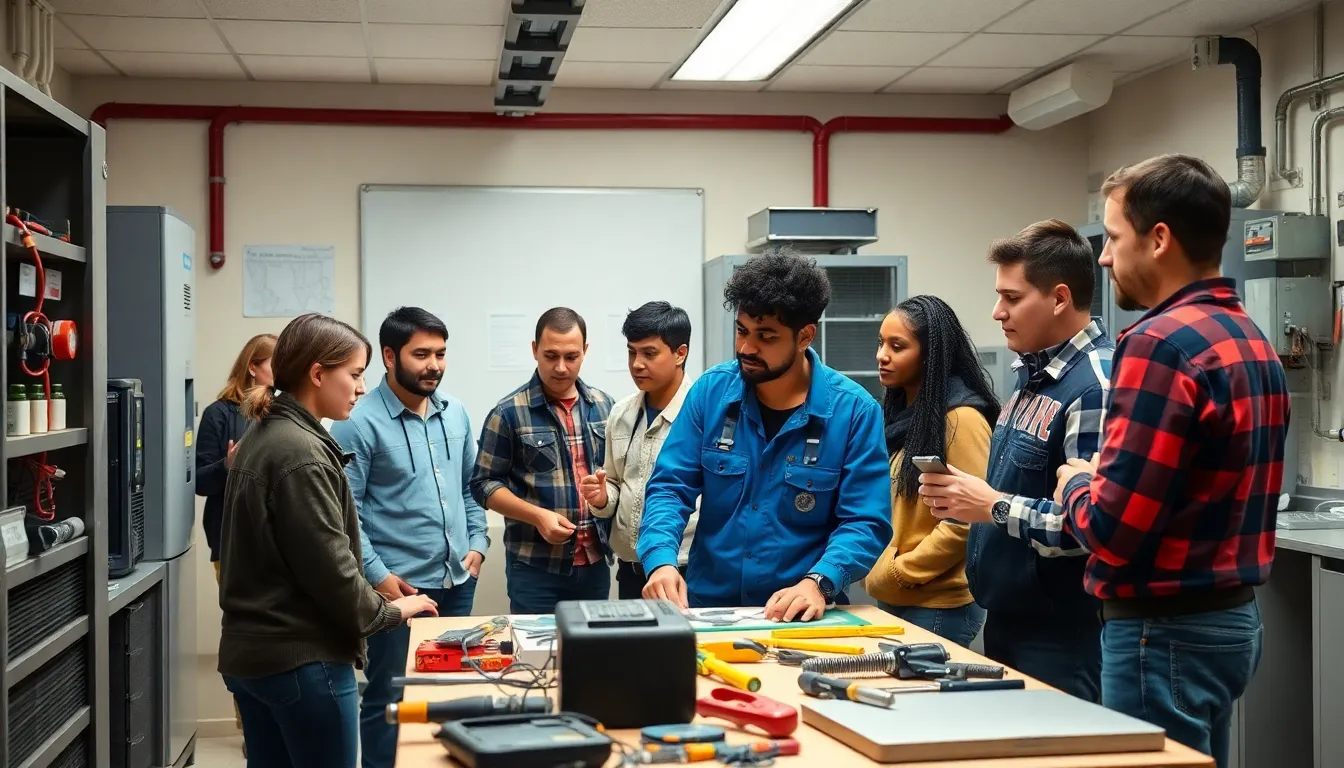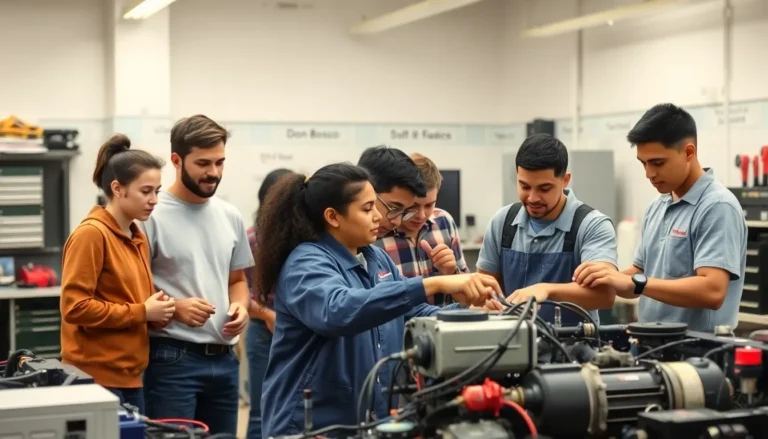In a world where comfort reigns supreme, HVAC technicians are the unsung heroes, battling the elements to keep homes cozy and cool. But before they can don their capes and wield their wrenches, they need the right training. HVAC tech training isn’t just about learning to fix a leaky duct; it’s about mastering the art of temperature control and becoming a wizard in the world of heating and cooling.
Table of Contents
ToggleOverview Of HVAC Tech Training
HVAC tech training plays a vital role in equipping technicians with the necessary skills to excel in their field. Comprehensive training ensures technicians can effectively manage and maintain complex heating and cooling systems.
Importance Of HVAC Training
Training holds immense value as it provides essential knowledge of HVAC systems. Understanding the principles of thermodynamics, fluid dynamics, and electricity is critical for effective troubleshooting and repair. Technicians gain insights into safety protocols, ensuring compliance with industry standards. Knowledge of contemporary technologies enhances their capability to work with smart systems and energy-efficient equipment. The training process also fosters problem-solving skills, enabling technicians to address various issues promptly.
Benefits Of Being Certified
Certification offers significant advantages in the HVAC industry. It boosts credibility among clients and employers, establishing trust in a technician’s expertise. Certified professionals often command higher salaries when compared to non-certified peers. Many employers prefer hiring certified technicians due to their proven understanding of best practices. Certification programs also provide access to ongoing education, ensuring skills remain current amid industry changes. Networking opportunities with other certified professionals can lead to job openings and career advancements.
Types Of HVAC Tech Training Programs

HVAC tech training programs come in various forms, each catering to different learning preferences and schedules. Understanding these options helps aspiring technicians choose the right path for their career.
Online vs. In-Person Training
Online training provides flexibility, allowing students to learn from home at their own pace. Many programs offer video lectures, interactive quizzes, and virtual simulations to mimic real-world scenarios. In-person training, however, emphasizes hands-on experience in a classroom setting. Students engage directly with instructors and participate in live demonstrations. Both formats enhance learning, yet the choice often depends on individual preferences and lifestyle.
Apprenticeships and Hands-On Experience
Apprenticeships combine classroom learning with on-the-job training under the supervision of experienced technicians. This approach offers invaluable real-world experience and exposes students to various HVAC systems. Hands-on experience strengthens practical skills, making it easier to troubleshoot issues effectively. Many employers prefer candidates with apprenticeship experience, as it demonstrates a commitment to the trade. Engaging in supervised work environments fosters confidence, enabling technicians to excel in their roles.
Key Skills Developed In HVAC Training
HVAC training equips technicians with essential skills. These skills encompass both technical expertise and soft skills, ensuring a well-rounded professional.
Technical Skills
Hands-on experience with HVAC systems forms the foundation of technical skills. Training covers critical areas such as installation, troubleshooting, and repair of heating and cooling units. Understanding thermodynamics and fluid dynamics allows technicians to optimize system efficiency. Electrical systems knowledge ensures technicians can safely work with complex components. Familiarity with contemporary technologies, including smart systems, enhances a technician’s versatility. Detailed training in safety protocols also prepares technicians for real-world scenarios. Gaining these technical skills leads to better job performance and confidence in handling equipment.
Soft Skills
Soft skills play an equally important role in HVAC training. Effective communication helps technicians interact with clients to explain issues and solutions clearly. Problem-solving abilities enable quick and logical responses to unexpected challenges. Time management skills ensure technicians complete jobs efficiently and meet deadlines. Team collaboration fosters a positive workplace atmosphere, essential for successful projects. Adaptability prepares technicians for the fast-evolving HVAC landscape. Lastly, customer service skills enhance client relationships and lead to repeat business. Developing these soft skills complements technical training for overall professional success.
Career Opportunities After HVAC Tech Training
HVAC tech training opens diverse career avenues in the industry. Technicians possess skills that are in demand across various sectors, ensuring numerous job opportunities.
Job Roles in the Industry
Several job roles exist within the HVAC field. Technicians can become installation specialists responsible for setting up heating and cooling systems. Maintenance workers focus on regular servicing and repairs, prolonging the lifespan of equipment. Service technicians troubleshoot problems in existing systems, while sales representatives leverage technical knowledge to promote HVAC products. Supervisory positions offer advancement for experienced technicians, allowing them to oversee projects and team performance.
Potential Salary Expectations
Potential salary expectations vary based on experience and location. Entry-level HVAC technicians typically earn between $30,000 and $40,000 annually. Technicians with a few years of experience can see salaries rise to between $45,000 and $60,000. Specialized roles, such as HVAC engineers, may command higher salaries, reaching up to $85,000 or more depending on expertise and responsibilities. Factors affecting salary include education level, certifications, and demand in the specific job market.
Investing in HVAC tech training is essential for anyone looking to excel in this dynamic field. The comprehensive skills gained through formal education and hands-on experience empower technicians to tackle complex systems with confidence. With a focus on both technical and soft skills, training prepares individuals to meet the evolving demands of the industry.
Certification not only enhances credibility but also opens doors to better job opportunities and higher salaries. Whether through online courses or apprenticeships, the right training path can significantly impact a technician’s career trajectory. As the HVAC landscape continues to advance, staying updated with the latest technologies and practices will ensure long-term success and job security.




